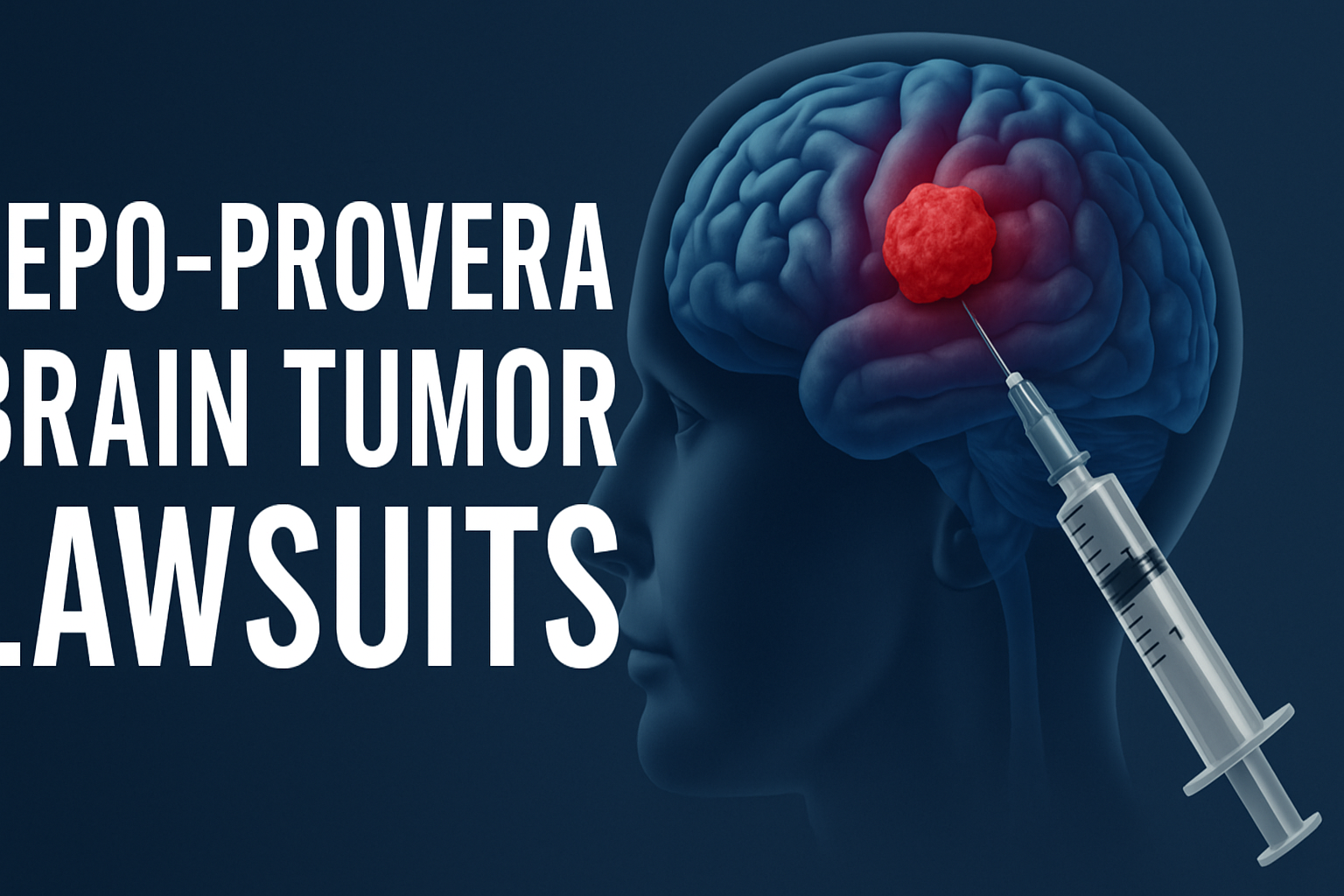Depo-Provera brain tumor lawsuits gain momentum across the United States. Patients claim the birth control injection caused an intracranial meningioma, a serious brain tumor. They allege that Pfizer failed to warn about the risks associated with the long-term use of medroxyprogesterone acetate.
Recent research supports these claims. A 2024 BMJ study reported a higher meningioma risk in people using Depo-Provera for many years. A 2025 JAMA Neurology analysis confirmed that risk rises after four or more years of injections. Older age at first injection may also increase danger.
French and Italian regulators posted strict warnings regarding high-dose medroxyprogesterone acetate. The U.S. Food and Drug Administration has not issued a specific warning for meningioma.
Federal Depo-Provera brain tumor cases now advance under MDL 3140 in the Northern District of Florida. Plaintiffs claim damages for medical expenses, lost income, and permanent injuries from these hormone-related brain tumors.
Understanding the Depo-Provera
Depo-Provera is an injectable contraceptive that prevents pregnancy for three months. It is in the form of medroxyprogesterone acetate, which is a synthetic version of the hormone progesterone. A physician gives the injection into a muscle, most commonly the upper arm or buttocks.
The injection works by inhibiting ovulation and thickening cervical mucus, completely blocking sperm and fertilization. Many people prefer this option because it is simple and does not require taking a pill daily. One injection provides three months of continual protection.
Depo-Provera has been available in the United States for use since 1992. Millions of patients have used Depo-Provera for long-term contraceptive use around the world. The injection is considered an excellent option for anyone looking for a personal and hassle-free method.
Side effects can include weight gain, irregular bleeding, and delayed return of fertility. Current lawsuits focus on a more serious concern. Research links prolonged Depo-Provera use to intracranial meningioma, a rare but potentially fatal brain tumor.
Medical Evidence of Brain Tumor Risk
Research now highlights a strong connection between Depo-Provera and intracranial meningioma. A landmark French study published in 2024 analyzed thousands of patient records. Investigators found that long-term use of injectable medroxyprogesterone acetate significantly increased the risk of developing meningioma.
A 2025 JAMA Neurology analysis supported these results. It showed that people who used Depo-Provera for four or more years faced a higher likelihood of meningioma diagnosis. Risk rose further when injections began after age thirty. These findings confirm that duration and age both matter.
Scientists believe continuous exposure to progestin fuels tumor growth. Meningiomas express hormone receptors that are responsive to progesterone-like substances. Constant exposure can induce susceptible activities in cells and potentially lead to the development of tumors.
The perceived risk level is low, but the collective literature trends in the same direction. This medical literature and research are an important aspect of the current lawsuits concerning Depo-Provera and brain tumors, providing support in response to the medical authorities in the country.
Global Medical Authority Responses
Medical authorities worldwide have reviewed Depo-Provera and its association with meningioma. In 2024, France’s drug regulatory authority, ANSM, issued new safety advice stating that Depo-Provera and other high-dose medroxyprogesterone acetate products carry an identifiable risk of meningioma. Physicians in France actively limit prescribing Depo-Provera when there are safer treatment options available.
Italy’s drug regulatory authority, AIFA, issued similar advice not much later when it publicly advised against prescribing Depo-Provera in women with a “history of” or current meningioma. The partial recommendations included reconsideration of options for long-term treatment and that patients should be informed about the associated risks.
In the U.S., the Food and Drug Administration keeps monitoring evidence. The FDA has not placed a direct meningioma warning on the Depo-Provera label. This lack of a formal warning is at the heart of most current Depo-Provera brain tumor lawsuits.
Professional organizations, such as the American College of Obstetricians and Gynecologists, now advocate for extensive counseling. They advise patients to weigh the benefits against the emerging brain tumor data before choosing this birth control shot.
How the Lawsuits Began
The legal battle over Depo-Provera brain tumor claims developed in clear stages. Each stage built pressure and drew more national attention.
First Legal Actions
The story began after early European safety alerts raised concern about Depo-Provera. Patients who developed intracranial meningioma after years of injections contacted attorneys. They claimed Pfizer failed to warn doctors and users about the tumor risk linked to long-term medroxyprogesterone acetate exposure.
Building the Cases
From those first claims, attorneys shaped detailed arguments. Lawyers built cases around new medical studies and regulatory notices. Each complaint alleged that the company was aware of or should have been aware of the danger. Plaintiffs argued that stronger warnings could have prevented their tumors or allowed earlier detection.
Growing National Attention
Momentum increased as more people came forward. As reports grew, more people stepped forward. Class-action inquiries have started in several states. National media coverage highlighted the connection between Depo-Provera and meningioma.
Pfizer’s Defense
The next stage featured Pfizer’s official response. Pfizer denied wrongdoing and raised key defenses. The company argued that U.S. labels met all Food and Drug Administration standards. It also pointed to the low absolute risk of meningioma and questioned whether the drug directly caused the tumors.
Foundation for Federal Litigation
All these steps led to the current federal multidistrict litigation. These disputes laid the groundwork for today’s consolidated lawsuits, which are now being heard in U.S. courts.
MDL 3140: Current Litigation Status
The Depo-Provera brain tumor lawsuits now move forward inside a federal multidistrict litigation, or MDL. This process combines hundreds of similar cases for faster and more consistent rulings.
Creation of the MDL
In February 2025, the Judicial Panel on Multidistrict Litigation formed MDL 3140 in the Northern District of Florida. Judge M. Casey Rodgers oversees all federal Depo-Provera brain tumor lawsuits. This consolidation simplifies discovery and avoids conflicting pretrial decisions across different courts.
Case Numbers and Growth
The MDL quickly expanded after formation. More than 500 individual lawsuits now belong to the centralized docket. New claims continue to join as patients learn about the potential meningioma risk from long-term Depo-Provera use.
Key Motions and Strategy
Current hearings focus on crucial legal arguments. Pfizer made a motion of preemption, asserting that federal law bars failure-to-warn claims since the Food and Drug Administration did not mandate a meningioma warning. Plaintiffs maintain that Pfizer had sufficient information to revise the label independently.
Bellwether Plans
The court chose initial pilot cases, referred to as bellwethers, to try evidence and estimate potential settlement values. Results of the trials will inform future negotiations and potential nationwide settlements.
Next Steps
Attorneys currently trade documents, conduct depositions, and develop expert testimony. The court will decide significant motions ahead of the initial bellwether trials. The rulings will determine the timeline and affect potential settlements for all Depo-Provera brain tumor claimants.
Eligibility to File a Claim
Potential plaintiffs considering a Depo-Provera brain tumor lawsuit need to qualify for a claim. Knowing these qualifications helps patients decide whether to seek the services of an attorney.
Proven Depo-Provera Use
You need clear records of Depo-Provera injections. Medical charts, pharmacy receipts, or clinic records should show at least two injections. Longer documented use strengthens a potential claim and supports a duration-related risk argument.
Confirmed Meningioma Diagnosis
A doctor must confirm an intracranial meningioma through imaging or pathology. MRI or CT scan results, along with surgical or biopsy reports, provide essential proof for any lawsuit.
Link Between Use and Diagnosis
Lawyers scrutinize timing. A strong case shows Depo-Provera use before the tumor developed. Risk appears higher after one to four years of injections, especially when treatment continues for many years.
Impact on Health and Daily Life
Attorneys also review the severity of medical effects. Vision loss, seizures, cognitive issues, and surgery-related disabilities can increase potential damage.
Consultation with Legal Counsel
Meeting these conditions does not guarantee payment. An experienced attorney can review records, explain deadlines, and file the complaint within the appropriate court system, including MDL 3140.
Potential Compensation
People who file Depo-Provera brain tumor lawsuits may be eligible to recover several types of damages. Each category reflects the real financial and personal impact of a meningioma diagnosis.
Medical Costs
Treatment, hospital stays, imaging, and chemotherapy or radiation treatments can be covered by compensation. Rehabilitation or medication costs in the future can also be eligible.
Income Lost
A brain tumor can compel time off from work. Compensation can be sought in lawsuits for lost wages and diminished earning capacity in cases where future employment is restricted due to symptoms.
Pain and Suffering
Meningiomas can lead to severe headaches, seizures, and permanent disability. Courts will award physical pain, emotional distress, and loss of enjoyment of life damages.
Long-Term Disability
Some patients have permanent neurological alterations. Compensation may cover the requirement of home care, mobility devices, or special adjustments.
Punitive Damages
In the event of reckless behavior, a court will award punitive damages to punish the company and deter similar behavior in the future.
Each case is unique. Settlement amounts depend on medical records, documented losses, and the strength of evidence presented during MDL 3140 proceedings.
Statutes of Limitation
Deadlines for filing a Depo-Provera brain tumor lawsuit vary by state. Failing to meet these limits can end a claim before it even begins.
Discovery Rule
Many states follow a discovery rule. The clock starts when you first learn or should have learned that Depo-Provera may have caused your meningioma. This rule helps people who have only recently discovered the medical connection.
Typical Timeframes
Some states allow only two years from the date of discovery to file a claim. Others give up to four years. Several states offer varying deadlines for personal injury and product liability cases.
Importance of Early Action
Fast action protects legal rights and preserves evidence. Medical records, pharmacy logs, and witness statements are easier to gather soon after diagnosis. Early contact with a lawyer ensures compliance with all deadlines.
MDL Considerations
Joining MDL 3140 does not automatically extend every state deadline. Attorneys continue to track individual statutes to ensure each case remains valid within the federal consolidation.
Understanding these timelines is critical. Acting promptly safeguards the chance to pursue compensation.
Constructing a Solid Case
Developing a strong Depo-Provera brain tumor lawsuit involves careful planning and precise evidence. Every step enhances the argument and leads towards a winning case.
Accumulate Complete Medical Records
Obtain all records of Depo-Provera injections. These include doctors’ notes, clinic logs, and pharmacy receipts. Add imaging scans and pathology reports to establish an intracranial meningioma. These reports develop exposure and diagnosis.
Document Health Impact
Maintain a daily symptom diary to record any symptoms, such as headaches, changes in vision, or seizures. Document days lost from work and any lifestyle modifications. These specifics demonstrate how the tumor influences daily functioning and earning potential.
Obtain Expert Testimony
Lawyers typically retain medical experts to describe how medroxyprogesterone acetate may lead to meningioma growth. Expert medical testimony establishes a strong correlation between the medication and the brain tumor.
Work With Experienced Lawyers
An MDL 3140-experienced attorney can handle complex federal procedures. The attorney will prepare the complaint, oversee discovery, and advocate for you in settlement negotiations or trial.
Save Evidence Early
Move urgently to prevent lost documents or lost memories. Early action prevents medical and employment records from becoming inaccurate or incomplete for court review.
Frequently Asked Questions
Crystal-clear responses enable individuals to comprehend the Depo-Provera brain tumor lawsuits and determine a course of action. Brief answers address the most frequently asked questions.
Does Depo-Provera lead to brain tumors?
There is an increased risk of intracranial meningioma following long-term Depo-Provera use, according to studies. Researchers attribute the risk to exposure to progestin, although the absolute risk remains low.
Has the FDA warned?
The U.S. Food and Drug Administration has not inserted a generalized meningioma warning on Depo-Provera labeling. Future revisions may be based on continuing studies.
What is MDL 3140?
MDL 3140 is the federal multidistrict litigation that consolidated all Depo-Provera brain tumor cases. It consolidates cases for quicker, uniform rulings under one judge.
Who is eligible to file a claim?
A plaintiff must produce Depo-Provera injection records and a confirmed intracranial meningioma diagnosis. The timing of administration and the severity of symptoms are also important.
What damages can plaintiffs recover?
Possible damages include medical expenses, lost wages, pain, suffering, and long-term disability benefits. In some cases, punitive damages may be awarded for reckless behavior.
How soon should I act?
State statutes of limitation vary. Early consultation with an experienced attorney protects legal rights and keeps evidence intact for the MDL process.
Conclusion and Call to Action
Depo-Provera brain cancer lawsuits increase in number throughout the United States. Medical research verifies an increased risk of intracranial meningioma following extended exposure to this birth control injection. Regulators in France and Italy have issued stern warnings, but the U.S. Food and Drug Administration has not included a dedicated warning for meningioma.
Federal lawsuits are currently proceeding through MDL 3140 in the Northern District of Florida. Hundreds of claimants seek recovery for medical costs, lost wages, and permanent conditions. Early bellwether trials will indicate how possible settlements may proceed and how that may affect future litigation.
If you, or your loved one, took Depo-Provera and were later diagnosed with a meningioma, the time to act is now. Obtain the relevant medical records, document the symptoms, and contact an experienced attorney. You must act promptly to preserve your rights and evidence. Take action today. Find out about your options and safeguard your future by consulting with a qualified attorney regarding entry into the current Depo-Provera brain tumor litigation.
Ayesha Awais is a content writer for JudicialNexus.com, covering accident reports, injury-related news, lawsuits, and public safety updates. All content is informational in nature and based on publicly available sources.




